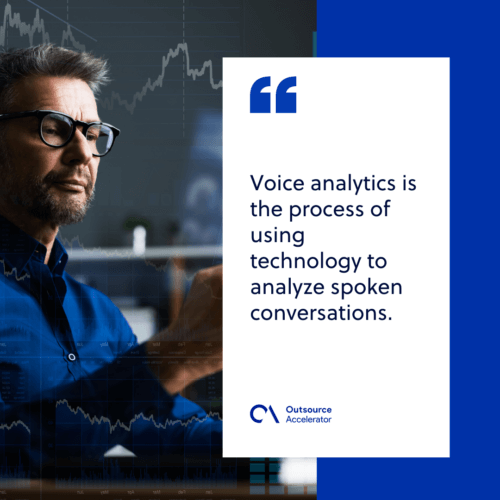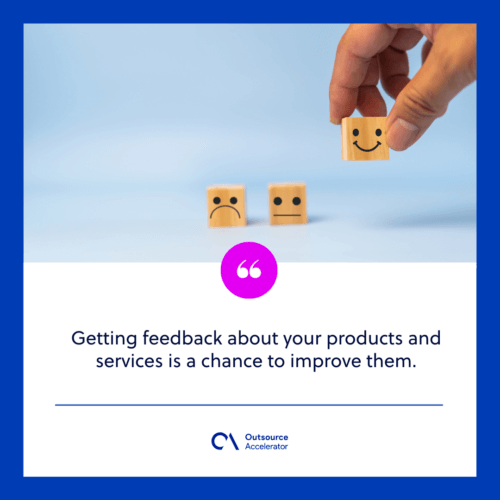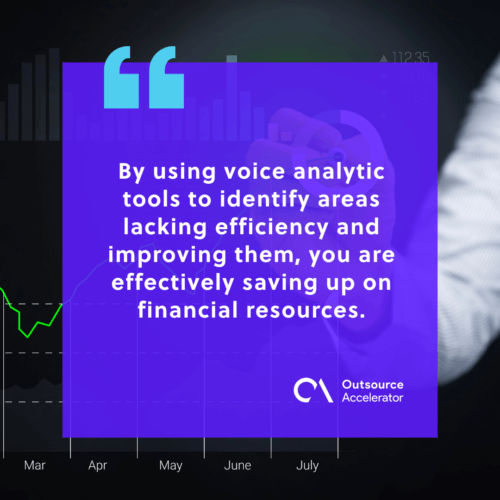What is voice analytics?

Businesses would be nothing without the support of their customers. Both from a business standpoint and for sincere gratitude, it’s only right for companies to provide their customers the best experience possible.
However, this may come as a challenge at times.
All of your customers are individuals with their own personalities. Strategies that work with one type of customer may not fly well with another group of customers. Something that can help with this issue is voice analytics.
Continue reading this article to find out more information about voice analytics, such as: its definition and benefits, how it works, voice analytics vs. speech analytics, as well as the different purposes that voice analytics serves.
Voice analytics explained
Voice analytics is the process of using technology to analyze spoken conversations.
Voice analytic tools record conversations and can instantly transcribe them into written text for perusal. They can even identify the emotions of callers based on their speech patterns.
How does voice analytics work?
Voice analytics works by analyzing a speaker’s voice. Voice analytic tools have three main components: Natural language processing, intent classification, and analytics.
Natural language processing (NLP) interprets the spoken words and identifies relevant keywords.
Meanwhile, intent classification uses advanced classification algorithms to understand true intentions within a conversation.
Finally, analytics provide insights into recorded calls, such as pauses, intonation, and other nonverbal cues present. These could all be indications of either customer satisfaction or their frustration.
Voice analytic technology analyzes spoken words and compares them against an established database of common phrases and keywords.
Voice analytics vs. speech analytics: Key differences
To put it simply, voice analysis is for examining voices and words used in a spoken conversation.
On the other hand, speech analytics software focuses only on the actual words used in a conversation. Unlike voice analysis, it disregards tone, intonation, volume, pitch, and other conversational cues.
Speech analytics is more concerned with the recording and transcription of words used in a call. This type of analysis can be used by call center agents and supervisors for sorting and identifying keywords across several conversations.
The importance of voice analytics
Several industries including insurance, healthcare, and financial services are taking advantage of voice analytic technology.
The area of any business that can really benefit from voice analytics is customer service.
By using these analytics, companies can identify vital and previously overlooked company information regarding customer conversion. They can even prompt companies to provide solutions to problems that haven’t yet risen.
Voice analytic tools can help supervisors identify the winning characteristics of agents and encourage the use of them.
On the other hand, voice analytic tools can also identify what agent mannerisms affect customers negatively, and supervisors can then advise against those.

Voice analytics use cases
Below is a list of purposes voice analytics can serve:
1. Market research
It can be challenging to put yourself into your customers’ shoes. This is potentially disastrous since you can’t effectively sell to people if you don’t know what they need.
How do your customers talk? What features are they looking for that you haven’t provided yet? What is their favorite among your existing products?
The answers to these questions may be found by analyzing recorded conversations. Voice analysis is a great way to understand your customers better.
You and your employees can use the gathered data to improve your marketing strategies. This way, your company can reach more potential customers and further please current ones.
2. Assessing agent performance
Besides customer satisfaction rating (CSAT), there aren’t other easy ways to assess your agents’ performances. Voice analytics allow you to assess your agents’ efficiency in a better way.
Since calls are instantly transcribed into text, keywords relating to agent performance can be conveniently looked up.
For instance, you can search for expressions of gratitude such as “thank you so much.” If a transcript shows that a customer says this quite often in the span of one call, then that customer must find their assigned agent very helpful.
Another helpful asset for reviewing agent performance is the emotion-identifying feature of voice analytic tools. This feature can tell you if an agent is having a negative impact on a customer’s mood.
By seeing the dialogue as well, you’ll be able to pinpoint the exact sentence that tipped off the customer. Knowing this can help an agent avoid doing the same mistake in the future.
3. Useful feedback
Whether positive or negative, it’s always good for a business to receive and review feedback.
Getting feedback about your products and services is a chance to improve them. You may have customers who call just to complain about an unfortunate experience with your company.
Use this as an opportunity to improve your offerings, especially regarding constant, repeated complaints.
Additionally, some of your customers don’t have social media presence or can’t otherwise access your customer service department outside of calling. This makes using voice analytic tools to record feedback all-the-more valuable.
4. Insight for improved employee training
It’s only smart to update your agent training curriculum once in a while. Perhaps there are new trends present which must be included, a better tool to implement, outdated strategies and information, or some oversight from previous versions.
Voice analytics can provide your company with insight that can be useful for employee training and re-training.
By recording agents’ conversations with customers, you can discover negative habits present in your employees. These habits may be self-developed, or a result of training oversight.
Whatever the case, the information you get from voice analysis is a great resource for reassessing the current version of your training curriculum and perhaps make changes.
5. Checking regulatory compliance
It’s important to ensure regulatory compliance in each call made in your company.
Voice analytics helps with this. Your company can identify potential issues with compliance and resolve them before they even pose an actual threat.

The benefits of using voice analytics
By utilizing voice analytics, your company can experience the benefits it offers, including:
1. Cost-effective
By using voice analytic tools to identify areas lacking efficiency and improving them, you are effectively saving up on financial resources.
Resolution calls can be done more effectively in a shorter amount of time, therefore allowing more customers to call in the same timespan.
Using voice analysis to improve your employee training curriculum as soon as possible will refrain you from spending more resources than necessary on re-training agents.
Investing in voice analytics is the better choice for your business over letting inefficiency continue.
2. Improved customer service
Voice analytic tools allow your agents to know how a customer is feeling in real-time. This means your agents can find out if they’re impacting a customer positively or negatively while in a conversation with them.
Information like this gives agents an idea of what action to take next. When they discover a customer to be irritable, for instance, they can quickly improvise a way to improve the customer’s mood.
In addition, using voice analysis for marketing research and to address feedback contribute to providing a better customer experience (CX).
3. Optimizing the sales process
Voice analytics can be used to optimize your company’s sales process.
Analyze conversations, identify what lead-conversion calls have in common and what agents say that seem to repel people from buying products.
With enough information, you can revise your sales process to be more engaging, more convincing, and less time-consuming.
4. Understand customers better
As mentioned, voice analytics can be used to understand customers better.
Know their pain points, see what pleases and displeases them, discover what they think is missing from your products and services.
Understanding your audience more can only help you give customers a better experience with your company. It’s a win-win for everyone.
5. Competitive intelligence
Voice analysis is a way for you to get ahead of your competition.
Analyzing conversations with customers provides you with insight that companies of the same industry may not have yet discovered.
6. Keyword organization
Voice analytic tools help you better keep track of significant keywords, may it be about certain products, names of rival companies, pricing.
Use voice analytic features to categorize keywords and filter through topics easily. At a glance, you’ll be able to see which conversations are noteworthy depending on the information you want to know.

Utilize voice analytics to your advantage
Adapting to new environments, trends, and technology is a vital trait for a businessperson to have.
Not having your company and customer service representatives use voice analytics by now is equivalent to falling behind.
Voice analytic tools may be quite tolling to implement, especially in a long-established company that’s used to doing things in a certain way. However, all the uses and advantages of voice analysis mentioned in this article will prove that it pays off.
Use voice analytics to your advantage; improve your customer experience and employee training, and gain a competitive edge over your rival companies.







 Independent
Independent




